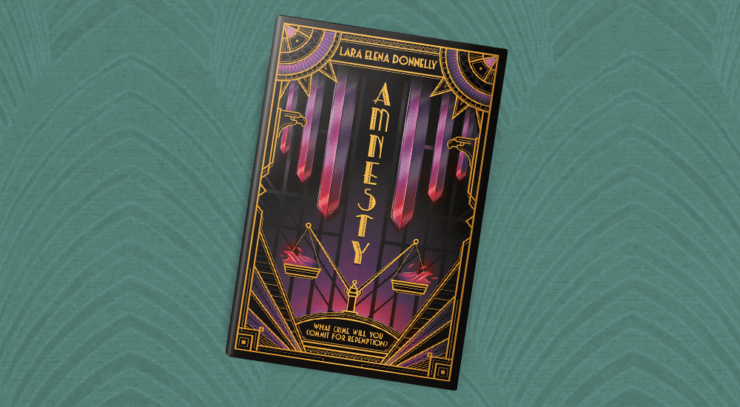Lara Elena Donnelly’s Amberlough series, which began in 2017’s Amberlough, continued with last year’s Armistice, and concludes (it seems) in this latest volume, Amnesty, has always focused on complicated people whose ethics are at best extremely flexible and at worst practically non-existent. None of these characters are good people: most of them are fundamentally selfish, frequently ambitious, and guided primarily by what they want, rather than any idea of their responsibility to other people. (Even their love affairs are, at root, fundamentally selfish.)
So it’s quite a triumph of craft that, nonetheless, Donnelly is able to make many of her characters understandable, relatable, and even sympathetic. Donnelly’s good at showing ordinary people—people who just want to get on, get ahead—caught and ground up in the gears of movements, moments, and politics that are bigger than they are.
Amberlough focussed on spy Cyril DePaul, his lover Aristide Makricosta, and cabaret dancer Cordelia Lehane, in the titular city on the eve of a fascist coup. Cyril proved instrumental to the coup’s rise, and the end of the novel sees Aristide fled, Cordelia kicking off a nascent resistance movement, and Cyril left for dead. Armistice takes place outside Amberlough, in a foreign country, and sees Aristide now working in the film industry, Cordelia escaped just ahead of a bullet in the back of the head, and Cyril’s sister Lillian—whose family situation in the form of her son and his foreign father makes her particularly vulnerable to pressure—working for the fascist Ospies’ diplomatic service, pressured into espionage and intrigue. At the end of Armistice, Cordelia has returned to enemy territory, Lillian and her son and her lover have escaped the Ospies, and Aristide has heard a rumour that Cyril might be alive and has decided to chase that narrow possibility.
Amnesty takes place some time after. The Ospies have been overthrown and a transitional government now rules in their stead, preparing for democratic elections. Cordelia is dead. Lillian DePaul has returned to Amberlough to work for the transitional government and to try to position herself for a role in whichever government succeeds it—a move that has put a lot of strain on her relationships with her husband and her son. Aristide has been invited to a memorial celebrating Cordelia. And Cyril, it turns out, is alive.
And it turns out that Aristide still values Cyril unreasonably highly. As Cyril—battered, scarred, guilt-wracked, and passively suicidal—reconnects with his family, as Lillian’s career suffers for his presence, and as the politics of the new election coalesce in response to Cyril’s lightning-rod history of betrayal, Aristide makes a series of desperate decisions in order to try to keep Cyril from the justice system of a country that has every reason in the world to hate him—and to execute him. Desperate and frequently ill-judged decisions. And Lillian, despite her precarious position and even more precarious finances, isn’t willing to abandon her brother. But Cyril isn’t all that eager to fight for his own survival. Does he deserve to live? That’s the question he hasn’t bothered answering for himself yet.
Buy the Book


Amnesty
Amnesty is a book about broken people reaching for personal happiness, and fucking up a lot along the way. (Neither Aristide nor Lillian nor Cyril are really held back by the idea of collateral damage.) Its personal relationships are all deeply fraught with history and damage—frequently self-inflicted damage. And its political relationships are enormously tense and in constant motion, aligning and realigning to suit the moment: watching Amnesty’s series of nested political chessmatches is fascinating and compelling, though one does occasionally want to shake the participants out of their not-uncommon solipsism.
And yet, Amnesty pulls off an emotionally satisfying conclusion, one that feels informed by what came before without feeling inevitable. At the end, it reaches for the hope that people can do better, at least in small ways—can learn from their choices. As the capstone of a trilogy, it works, and works well. I enjoyed it.
Even if I really wouldn’t like to have to work with any of its protagonists.
Amnesty is available from Tor Books.
Book cover: Tor Books; Background image: Roger Veringmeier. Modified from original under CC BY-SA 4.0 license.
Liz Bourke is a cranky queer person who reads books. She holds a Ph.D in Classics from Trinity College, Dublin. Her first book, Sleeping With Monsters, a collection of reviews and criticism, was published in 2017 by Aqueduct Press. It was a finalist for the 2018 Locus Awards and was nominated for a 2018 Hugo Award in Best Related Work. Find her at her blog, where she’s been known to talk about even more books thanks to her Patreon supporters. Or find her at her Twitter. She supports the work of the Irish Refugee Council, the Transgender Equality Network Ireland, and the Abortion Rights Campaign.










